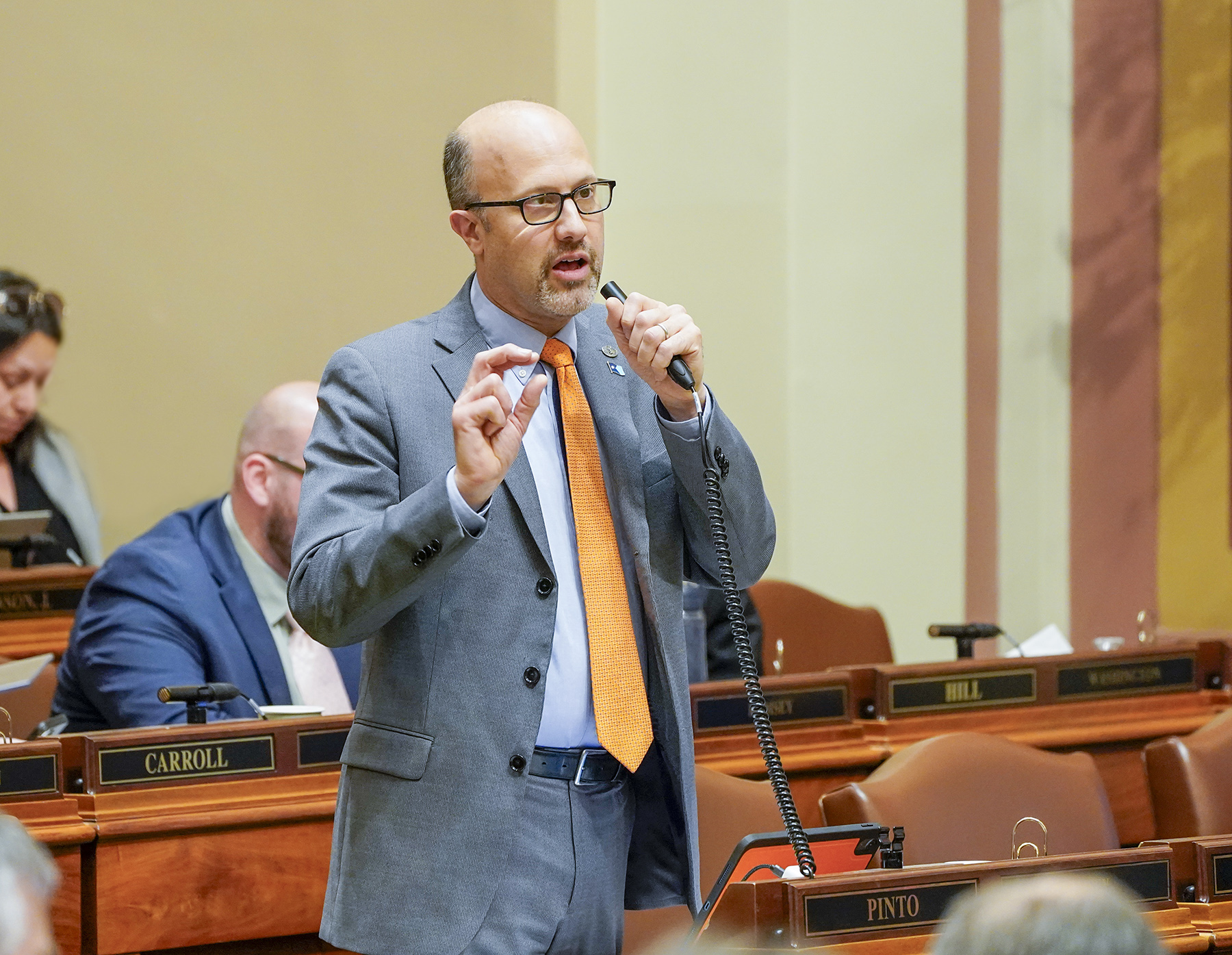Minnesota House passes compromise workforce, economic development budget bill

Some House members believe the budget bill that came out of the House Workforce, Labor, and Economic Development Finance and Policy Committee spends too much. Some think it provides too little.
But even if they don’t think the omnibus bill is just right, most lawmakers thought it was good enough for a green vote. It passed the House, as amended, 115-19 Friday.
Co-chaired by Rep. Dave Baker (R-Willmar) and Rep. Dave Pinto (DFL-St. Paul), who sponsors the House version of HF2440/SF1832*, the workforce committee was charged with cutting $50 million from General Fund appropriations.
“I think we did that in a smart way that does not cause undue harm to our workers,” Baker said.
For the 2026-27 biennium, the bill would provide $281.62 million in General Fund expenditures for programs that support job training programs, enforcement of labor laws, and economic development projects.
It would include $161 million to the Department of Employment and Economic Development, a cut of $52.75 million from the February forecast base.
Some savings would come through eliminating the Minnesota Investment Fund and the Job Creation Fund.
The bill would also provide $18.34 million to the Department of Labor, an increase of $3.9 million, and $34.06 million to Explore Minnesota — a $1.65 million decrease — for its tourism and economic development projects.
Among new spending in the bill would be more money for programs that aim to improve the quality and accessibility of child care, a registered teacher apprenticeship program, and beefed up enforcement of misclassification laws.
The bill would also limit direct appropriations in favor of some competitive grant programs. Pathways to Prosperity, which offers grants to nonprofits that help adults get training and find jobs, would receive an additional $5 million. There would also be an additional $1.5 million for Youth at Work.
Members of the House People of Color and Indigenous Caucus strongly support continuing direct appropriations. “Any new system must be co-created with those most impacted and must not perpetuate the same structural barriers we are collectively working to dismantle,” they said in a statement.
The House budget will now have to reconcile with the Senate’s budget bill, which passed 35-30 April 29 with an additional $24.29 million in spending from the General Fund and $40.86 million from the Workforce Development Fund. The Senate bill includes about $30 million in direct appropriations.
[MORE: Workforce and economic development spreadsheet, labor spreadsheet]
Policy provisions
Due to an amendment successfully offered by Rep. Kristin Robbins (R-Maple Grove), the bill includes whistleblower protection provisions from HF23 that passed the House 133-0 March 10.
Another provision would allow non-compete clauses in cases of employees with annual salaries higher than $200,000 working in research and development or anyone who has salaries more than $500,000 per year. Republican Floor Leader Harry Niska (R-Ramsey) said the complete prohibition on non-compete laws passed in 2023 discourages companies from investing in Minnesota.
Rep. Emma Greenman (DFL-Mpls) unsuccessfully offered an amendment to eliminate the language. She said non-compete clauses unfairly keep people in jobs with lower pay or poor working conditions and hinder rather than encourage innovation.
Moreover, non-compete clauses don’t protect trade secrets, which are covered with non-disclosure agreements and other trade secret laws, she said. “Non-competes are not about the information; they are about the employee,” Greenman said.
Floor discussion
Rep. Jimmy Gordon (R-Isanti) said the bill uses taxpayer dollars to subsidize businesses and private nonprofits, which he opposes.
“We should give this money back to taxpayers to invest in themselves and not in legislators’ pet projects,” he said.
In contrast, Rep. Cedrick Frazier (DFL-New Hope), while supporting the bill, said he was disappointed there wasn’t more funding for organizations like Big Brothers Big Sisters, which can provide the kinds of mentorships and skill development that helped him get to the Legislature.
Rep. Isaac Schultz (R-Elmdale Township) said he fit between the two. “As a conservative, I’m excited to see us bending the curve on state spending,” he said, adding he wished it could be more.
Baker said he hopes to continue the discussion on earned safe and sick time and paid family leave, and believes modifying those programs will help small businesses, counties and school districts in a time of a labor shortage.
[MORE: Statements on the bill’s passage from committee chairs here and here]
Related Articles
Search Session Daily
Advanced Search OptionsPriority Dailies
Legislative leaders set 2026 committee deadlines
By Lisa Kaczke Legislative leaders on Tuesday officially set the timeline for getting bills through the committee process during the upcoming 2026 session.
Here are the three deadlines for...
Legislative leaders on Tuesday officially set the timeline for getting bills through the committee process during the upcoming 2026 session.
Here are the three deadlines for...